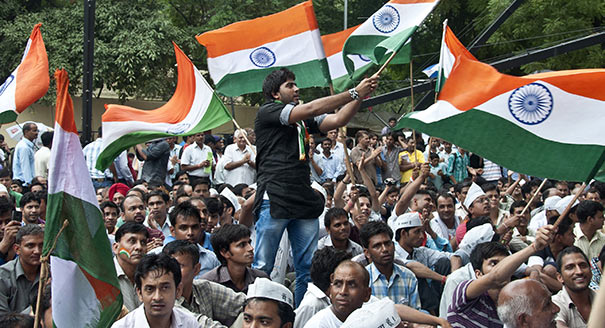It’s dangerous to dismiss Washington’s shambolic diplomacy out of hand.
Eric Ciaramella
{
"authors": [
"C. Raja Mohan"
],
"type": "legacyinthemedia",
"centerAffiliationAll": "",
"centers": [
"Carnegie Endowment for International Peace",
"Carnegie India"
],
"collections": [],
"englishNewsletterAll": "",
"nonEnglishNewsletterAll": "",
"primaryCenter": "Carnegie India",
"programAffiliation": "",
"programs": [],
"projects": [],
"regions": [
"South Asia",
"India"
],
"topics": [
"Foreign Policy",
"Global Governance"
]
}
Source: Getty
Former Indian Prime Minister Vajpayee’s “relaxed realism” on external issues stands in marked contrast to the liberals on the left and the nationalists on the right, who framed India’s international policies in extreme terms.
Source: Indian Express
Very few statesman have the capacity or opportunity to alter the basic direction of their nation’s foreign policies. The weight of geography, historical precedent, ideological baggage and bureaucratic inertia prevent leaders from a significant reorientation of external relations. Even internal political revolutions that seek to turn foreign policy upside down are eventually compelled to compromise with tradition.
Atal Bihari Vajpayee is among the few to have successfully changed the worldview of a large nation. To be sure, Vajpayee was standing on the shoulders of P V Narasimha Rao, who had to manage the aftershocks from the collapse of the Soviet Union and the end of the Cold War. And Rao had the benefit of important foreign policy innovations under Rajiv Gandhi.
Vajpayee, however, had ideas of his own that were not in tune with mainstream thinking. Some of them found expression when he was the foreign minister of India during the brief rule of the Janata government during 1977-79. When he became the prime minister two decades later, Vajpayee had the space, time and the political credibility to push for the big foreign policy breakthroughs.
In transforming India’s foreign policy, Vajpayee was not just departing from the Congress legacy but also discarding the Hindutva canon. During his tenure, critics on the left and right attacked him for both the political sins. The current widespread adulation for Vajpayee masks how serious the political criticisms of his foreign policy were during his prime ministerial tenure (1998-2004).
The diplomatic boldness of Vajpayee is reflected in his ability to transcend the Nehruvian legacy on foreign policy as well as the BJP’s nativist burdens. Vajpayee’s “relaxed realism” on external issues stands in marked contrast to the liberals on the left and the nationalists on the right, who framed India’s international policies in extreme terms. It could also remain, for a long time, the right metric by which Indian foreign policy ought to be judged.
Consider for example, Vajpayee’s nuclear question. His decision to conduct five nuclear tests in May 1998, barely weeks after taking charge as PM, would not have been possible without the preparatory work that was done under Rajiv Gandhi and Narasimha Rao. Vajpayee’s genius was in judging that India could defy the world opinion, bear the near-term costs, and elevate India’s nuclear standing in the world through creative diplomacy.
Vajpayee’s decision to bring India’s three-decades-old nuclear dispute with the world to a closure was denounced on both the left and right. The former denounced the nuclear tests as an abandonment of Nehruvian legacy that will have disastrous consequences. The left also denounced Vajpayee’s effort at bringing closure to India’s persistent nuclear dilemma as a “sell-out”.
The right which welcomed the nuclear tests, was on the same page as the left in trashing Vajpayee’s nuclear pragmatism as a political surrender. As Prime Minister Manmohan Singh persisted with the logic of reconciliation, the nuclear arguments continued. The left and right got together and came quite close to toppling the UPA government.
Vajpayee’s willingness to see India’s interests quite clearly, without the distorting ideological lens, was also reflected in his outreach to the United States. Jaws dropped in Delhi and Washington when he declared that that India and America were “natural allies”. Coming barely six months after the nuclear tests and the US nuclear sanctions following Pokhran-2, the idea of a “natural alliance” seemed quite outrageous.
At the height of the unipolar moment, no one in Washington was interested in “alliances”. In Delhi, both the left and right denounced it as the death knell for India’s strategic autonomy. That we have come so far from that debate is a reflection of Vajpayee’s genuine conviction on the possibilities with the US and his willingness to stand up to them amidst much domestic hostility, including in his own party.
Reconciliation with the US, in retrospect, would seem a lot easier than the mitigation of the more fundamental disputes with the two neighbours — Pakistan and China. Here again, Vajpayee brought sagacity to bear upon the issues. He matched the willingness to defend India’s interests — whether it was at Kargil or in confronting Beijing’s nuclear collaboration with Pakistan — with the recognition of the political need to address the core disputes by looking beyond stated positions.
Vajpayee’s tenure began with crises in the relations with both Pakistan and China. It ended with creating possibilities for resolving the longstanding Kashmir question with Pakistan and the boundary dispute with China. While success continues to elude India, the negotiating frameworks produced under Vajpayee remain the only way forward. On both these fronts, he got little support from either the main political trends or the foreign policy establishment. That was not something new for Vajpayee.
When Vajpayee ventured in early 1979 to China, the first foreign minister since Jawaharlal Nehru to travel there, the Nehruvians denounced him. Vajpayee’s call for a “a good neighbourhood policy” under the Janata government was met with jeers from the foreign policy establishment that privileged the trappings of regional hegemony over effective leadership.
When he went to Lahore in 1999 or resumed the peace process with Pakistan after the Kargil war, he was dismissed on the right as being too naive. His embrace of the West earned him brickbats from both left and the right. The strongest testimony to Vajpayee’s foreign policy judgements have stood the test of time. As on the nuclear issue and the US relationship, so on the relations with China, Pakistan and the neighbourhood, Vajpayee’s successors — Manmohan Singh and Prime Minister Narendra Modi — have sought to build on that agenda despite the continuing difficulties.
Vajpayee’s nuanced foreign policy thinking stands in contrast to the binaries that India’s foreign policy discourse revels in. His record is a valuable reminder that India needs a measured debate on the nature of India’s interests and on the means to secure them at a moment of great political and economic churn in the world.
This article was originally published in the Indian Express.
Carnegie does not take institutional positions on public policy issues; the views represented herein are those of the author(s) and do not necessarily reflect the views of Carnegie, its staff, or its trustees.
It’s dangerous to dismiss Washington’s shambolic diplomacy out of hand.

Eric Ciaramella
The India AI Impact Summit offers a timely opportunity to experiment with and formalize new models of cooperation.


Lakshmee Sharma, Jane Munga
EU member states clash over how to boost the union’s competitiveness: Some want to favor European industries in public procurement, while others worry this could deter foreign investment. So, can the EU simultaneously attract global capital and reduce dependencies?

Rym Momtaz, ed.
Europe’s policy of subservience to the Trump administration has failed. For Washington to take the EU seriously, its leaders now need to combine engagement with robust pushback.

Stefan Lehne
Leaning into a multispeed Europe that includes the UK is the way Europeans don’t get relegated to suffering what they must, while the mighty United States and China do what they want.

Rym Momtaz